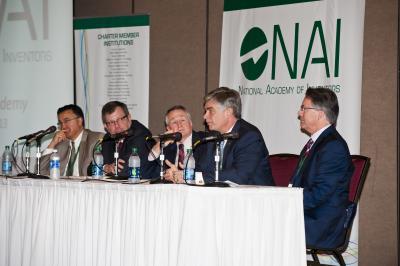TAMPA, Fla. (April 29, 2014) – When six university leaders took the stage at the 2013 Annual Conference of the National Academy of Inventors (NAI), held just over a year ago at the University of South Florida, they began a national conversation on changing the academic culture to recognize faculty patents and commercialization activity toward tenure and promotion. That conversation, according to NAI president Paul R. Sanberg, was long overdue.
The question posed to the panel, "Would Thomas Edison Receive Tenure," was answered with a clear "yes" and the paper that resulted, "Changing the academic culture: Valuing patents and commercialization toward tenure and career advancement," is published in the current Proceedings of the National Academy of Sciences.
"Over the past several decades, university missions have expanded from teaching and research to include economic development and translating university-based research into real products that benefit society," says Sanberg, the paper's lead author and senior vice president for research and innovation at the University of South Florida. "It is time these accomplishments were recognized for the value they bring to the university and to the world, and our faculty inventors are rewarded for them."
The paper is the first policy paper published by the National Academy of Inventors. All of the authors are fellows or charter members of the NAI.
The authors say that, while research activities that translate to product commercialization should not replace traditional scholarly pursuits such as teaching, mentoring students and publishing research, patent and commercialization activities should be considered equally in decisions related to faculty tenure and academic advancement.

This shows (from left) M. Gharib, Caltech; E. Kaler, U. of Minn.; R. Marchase, U. of Ala -- Birmingham; P. Harker, U. Del; and T. Sands, Purdue University.
(Photo Credit: Aimee Blodgett, USF News)
"The greatness of a university should not be measured by its research grants and contracts alone," write the authors. "Greatness is also measured by how the university impacts and changes for the better the world and society-at-large."
Future efforts to encourage a culture change that recognizes the value of faculty patents, licensing and commercialization activities can be enhanced by developing advocates for commercialization. The work of the National Academy of Inventors, a non-profit organization founded to recognize, encourage, and enhance the visibility of academic technology and invention, provides an example of such advocacy.
"The NAI and its university members and Fellows throughout the United States play an important role by encouraging innovation and bringing attention to the devalued role patents currently play in tenure and career advancement," says Sanberg.
The authors suggest that universities would do well to encourage and support bright young faculty and trainees to build careers that combine research and scholarship—the traditional academic paths to tenure and academic advancement—with translating that research to the market through patents, licenses, and the commercialization of their ideas and products to benefit society.